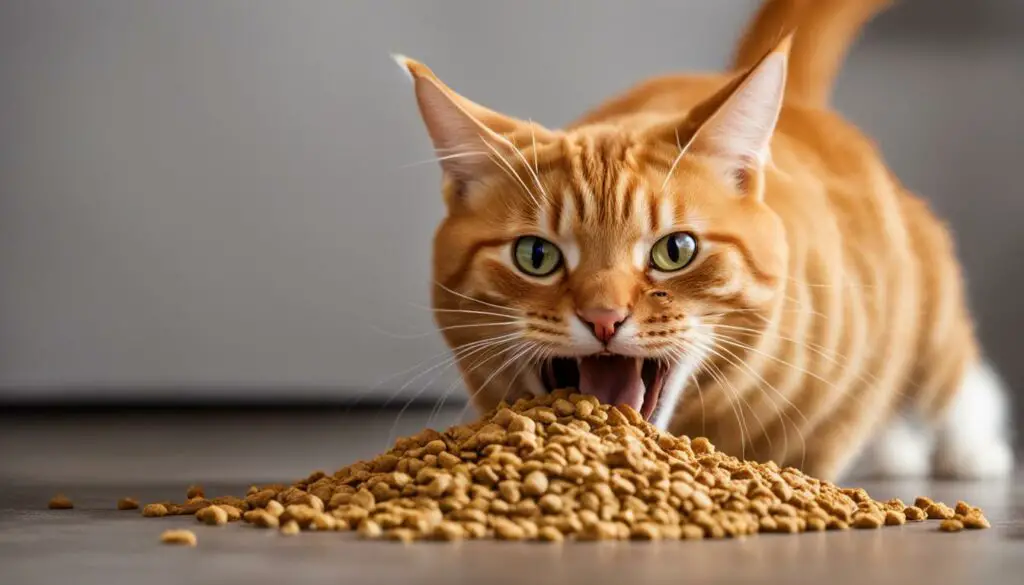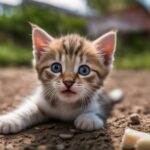Have you ever noticed your cat making a crunching noise with their mouth? It can be quite puzzling to hear these strange sounds coming from your furry friend. But fear not, there’s usually a reason behind it.
When cats make crunching noises with their mouth, it could indicate that something is not quite right. It’s important to understand the possible causes and take appropriate action to ensure your cat’s well-being. In this article, I will walk you through the reasons why your cat might be making these crunching sounds and what you can do about it.
Key Takeaways:
- Teeth grinding in cats can be a sign of underlying dental issues or other health problems.
- Tooth resorption, inflammatory gum disease, ulcers, and abnormal tooth alignment are common causes of teeth grinding in cats.
- Identifying the cause of teeth grinding often requires a thorough examination, x-rays, lab work, and sometimes tissue biopsies.
- Treatment options for teeth grinding include pain relief and addressing the underlying medical issues.
- Lifestyle changes, such as daily teeth brushing and a feline diet that promotes healthy teeth, can help prevent teeth grinding in cats.
Causes of Cat Teeth Grinding
Teeth grinding in cats, also known as bruxism, can be caused by various factors, including feline tooth resorption, dental diseases, and other underlying health issues. Understanding the causes of teeth grinding is crucial in addressing the problem and providing appropriate treatment for our feline friends.
Feline Tooth Resorption: This condition is characterized by the erosion of the dentin of the teeth, leading to severe pain and discomfort. It can occur in one or multiple teeth and is one of the most common causes of teeth grinding in cats.
Dental Diseases: Inflammatory gum disease, ulcers, cancer, and abnormal tooth alignment can all contribute to teeth grinding. Certain breeds, such as Persians and Siamese cats, may be more predisposed to dental issues due to their facial structure or tooth alignment.
Underlying Health Issues: Teeth grinding can also be a symptom of health problems beyond the oral cavity. Abdominal diseases, brain disorders, and behavioral issues may manifest as teeth grinding in cats. It is important to consider these possibilities and consult a veterinarian for a comprehensive evaluation.
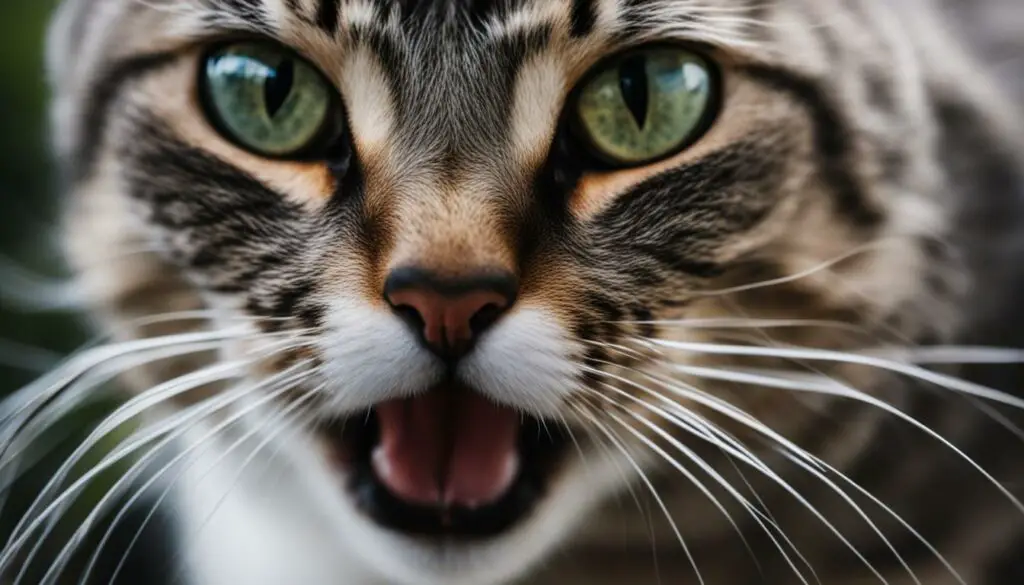
Feline Tooth Resorption
| Cause | Symptoms |
|---|---|
| Unknown | – Difficulty eating – Drooling – Red or swollen gums – Loose teeth – Teeth sensitivity – Reluctance to be touched around the mouth |
“Teeth grinding in cats can be caused by feline tooth resorption, dental diseases, and underlying health issues. Identifying the specific cause is essential in developing an effective treatment plan and ensuring the well-being of our furry companions.”
Dental Diseases
| Type of Dental Disease | Symptoms |
|---|---|
| Inflammatory Gum Disease | – Bad breath – Swollen or bleeding gums – Loose teeth – Reluctance to eat |
| Ulcers | – Pain while eating or drinking – Drooling – Avoiding certain foods |
| Cancer | – Abnormal growths in the mouth – Difficulty swallowing – Weight loss |
| Abnormal Tooth Alignment | – Overbite or underbite – Uneven wear on teeth – Difficulty chewing |
Teeth grinding in cats can be a sign of discomfort or pain. It is important to consult a veterinarian to determine the specific cause and provide appropriate treatment. Regular dental care, including professional cleanings and daily teeth brushing, can help prevent dental diseases and reduce the risk of teeth grinding in cats.
Identifying Causes of Teeth Grinding in Cats
Teeth grinding in cats can have various causes, including oral diseases, tumors, inflammation, and other underlying issues. Identifying the specific cause of teeth grinding usually requires a thorough examination and diagnostic tests such as dental x-rays, CT scans, lab work, and tissue biopsies. Around 85% of oral diseases that cause teeth grinding can be observed during a regular examination. However, additional tests may be necessary to diagnose less common causes or to evaluate issues outside the oral cavity.
Diagnostic tests such as dental x-rays and CT scans can provide a detailed view of the teeth and surrounding structures, helping to identify issues such as dental diseases, abnormalities in tooth alignment, or TMJ problems. Lab work, including blood tests, can help indicate the presence of underlying medical conditions that may contribute to teeth grinding. In some cases, tissue biopsies may be necessary to diagnose tumors or other more serious causes.
It’s important to consult a veterinarian if your cat is grinding their teeth, as they will be able to perform the necessary examinations and tests to determine the cause of the teeth grinding. Early identification of the underlying issues is crucial for effective treatment and pain relief. By working closely with a veterinarian, you can develop a comprehensive treatment plan to address the specific cause of the teeth grinding and provide your cat with the necessary care.
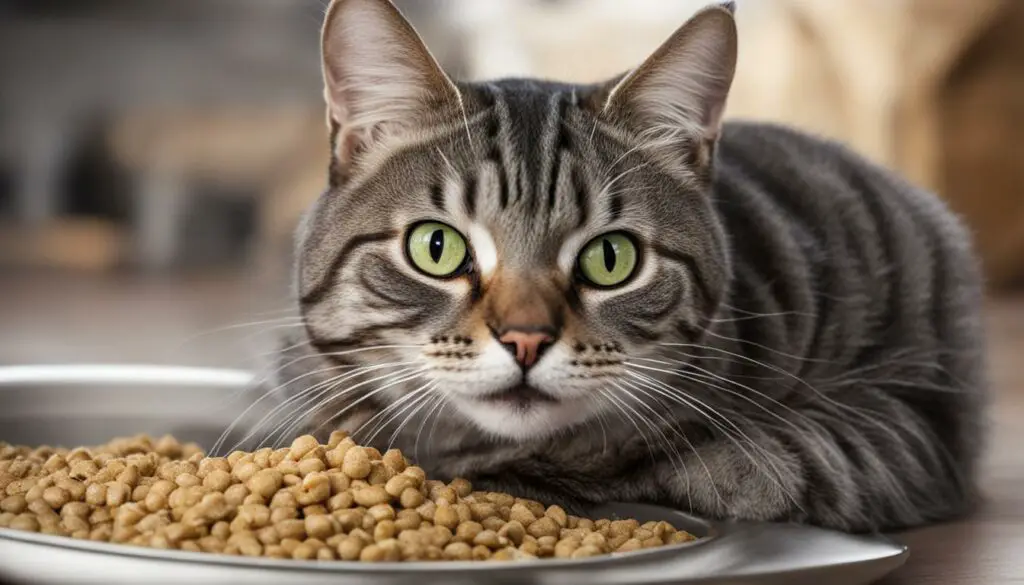
Summary of Causes and Diagnostic Tests for Teeth Grinding in Cats:
| Cause | Diagnostic Tests |
|---|---|
| Oral diseases | Regular examination, dental x-rays, tissue biopsies |
| Tumors | Tissue biopsies, imaging (CT scan, MRI) |
| Inflammation | Dental examination, lab work |
| Other underlying issues | Lab work, imaging (CT scan, MRI), consultation with veterinary specialists |
Identifying the cause of teeth grinding in cats is crucial for effective treatment and pain relief. Through a combination of thorough examinations and diagnostic tests, veterinarians can pinpoint the underlying issues and develop a targeted treatment plan. Early intervention and regular dental check-ups can help maintain your cat’s oral health and prevent teeth grinding in the future.
Treatment for Cat Teeth Grinding
When it comes to treating cat teeth grinding, the focus is on relieving pain and addressing the underlying medical issues. The specific treatment plan will depend on the severity of the dental disease and the cat’s overall health. Here are some common treatment options:
- Dental Cleaning: Professional dental cleaning can help remove plaque and tartar buildup, which contribute to dental diseases and pain. This procedure is typically done under anesthesia to ensure the cat’s comfort and safety.
- Tooth Extraction: If a tooth is severely decayed, damaged, or causing significant pain, it may need to be extracted. The extraction can help alleviate discomfort and prevent further dental problems.
- Restorative Crown: In some cases, a restorative crown may be necessary to protect and strengthen a tooth that has been damaged by dental disease or trauma.
- Pain Relief Medications: Pain relief medications, such as nonsteroidal anti-inflammatory drugs (NSAIDs), may be prescribed to alleviate the cat’s discomfort. These medications should only be used under the guidance of a veterinarian.
- Treatment Program: A comprehensive treatment program, designed by a veterinarian, may be recommended to address the underlying medical issues causing the teeth grinding. This may include additional dental procedures, medication, and lifestyle changes.
It’s important to consult with a veterinarian to determine the most appropriate treatment plan for your cat. They will take into consideration the cat’s overall health, the severity of the dental disease, and any other underlying medical conditions. With proper treatment and management, the cat’s teeth grinding can be effectively addressed, reducing pain and improving their quality of life.
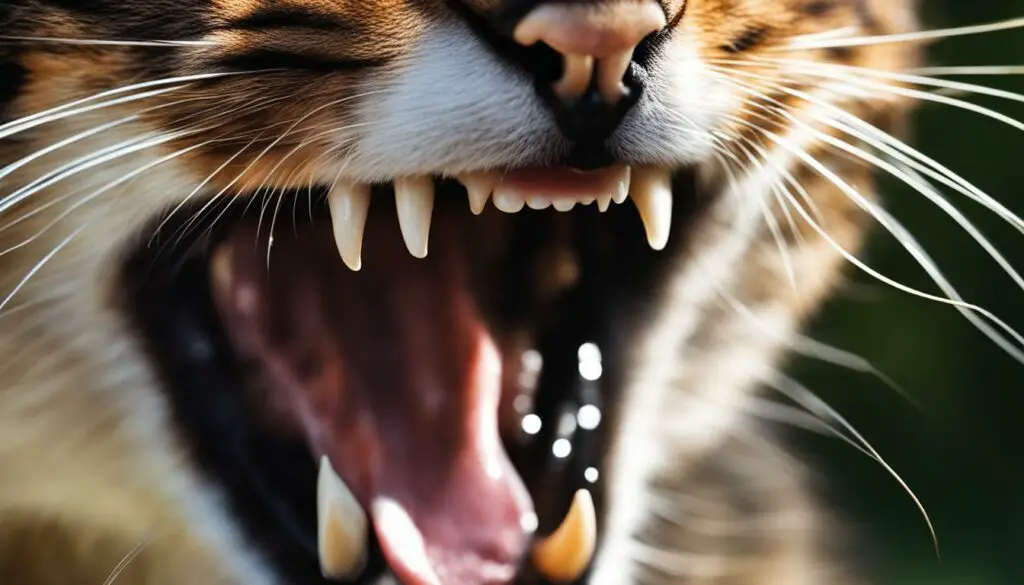
Table: Treatment Options for Cat Teeth Grinding
| Treatment | Description |
|---|---|
| Dental Cleaning | Professional removal of plaque and tartar buildup to improve oral health. |
| Tooth Extraction | Removal of severely decayed or damaged teeth to alleviate pain and prevent further dental issues. |
| Restorative Crown | Placement of a crown to protect and strengthen a damaged tooth. |
| Pain Relief Medications | Prescription of medications to alleviate discomfort and reduce inflammation. |
| Treatment Program | A customized plan designed by a veterinarian to address the underlying medical issues causing teeth grinding. |
Lifestyle Changes to Help Prevent Teeth Grinding in Cats
When it comes to preventing teeth grinding in cats, incorporating certain lifestyle changes can make a significant difference. By implementing these changes, you can help improve your cat’s oral health and reduce the likelihood of them making crunching noises with their mouth. Here are some key steps you can take:
- Daily Teeth Brushing: Start brushing your cat’s teeth on a daily basis, beginning from the age of two. This can help remove plaque and tartar buildup, preventing dental diseases and reducing the risk of teeth grinding.
- Dental Exams: Regular dental exams are crucial, especially for cats over the age of five. These exams can detect any oral diseases early on and allow for prompt treatment.
- Feline Diet: Feed your cat a feline diet that promotes healthy teeth and gums. Consult with your veterinarian to ensure you are providing the right nutrition for your cat’s oral health needs.
Incorporating these lifestyle changes into your cat’s routine can go a long way in preventing teeth grinding and maintaining their overall oral health. By taking proactive measures, you can help keep your furry friend happy and healthy.
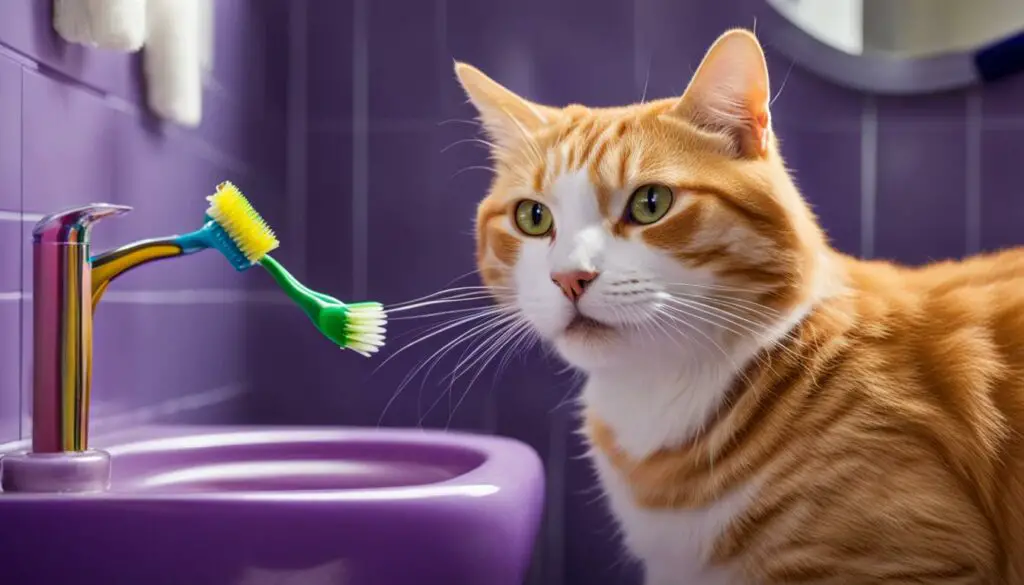
Dental Issues as a Cause of Teeth Grinding in Cats
Dental issues play a significant role in causing teeth grinding in cats. Conditions such as tooth decay, gum disease, tartar buildup, cavities, gum recession, and abscesses can all lead to pain and discomfort, which may result in your cat making a crunching noise with their mouth. One common dental problem that can cause teeth grinding is Feline Odontoclastic Resorptive Lesions (FORLs). These are holes in the teeth that resemble cavities but have an unknown cause. It’s important to address these dental issues promptly to alleviate your cat’s pain and prevent further complications.
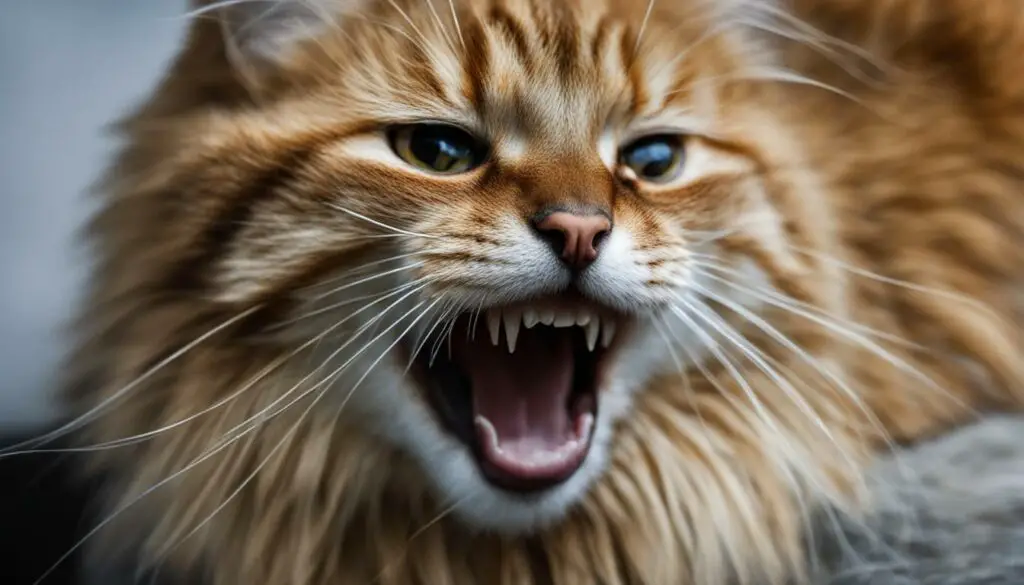
To better understand the dental issues that can cause teeth grinding, let’s take a look at a detailed comparison in the table below:
| Dental Issue | Symptoms | Treatment |
|---|---|---|
| Tooth Decay | Bad breath, yellow/brown discoloration, visible holes or pits in teeth | Fillings, root canal treatment, or extraction depending on the severity |
| Gum Disease | Red, swollen gums, bleeding gums, loose teeth | Professional cleaning, oral antibiotics, regular dental care |
| Tartar Buildup | Brown or yellowish deposits on teeth | Professional cleaning, regular dental care |
| Cavities | Visible holes or pits in teeth | Fillings, root canal treatment, or extraction depending on the severity |
| Gum Recession | Exposed tooth roots, sensitivity to hot and cold | Periodontal treatment, gum grafts |
| Abscesses | Swelling, pain, discharge from the gums | Drainage, antibiotics, tooth extraction |
| Feline Odontoclastic Resorptive Lesions (FORLs) | Holes in teeth, visible gum inflammation | Tooth extraction, pain relief, regular dental care |
As you can see, addressing these dental issues involves various treatments such as fillings, root canal treatment, professional cleaning, and tooth extraction. It’s crucial to consult a veterinarian for an accurate diagnosis and appropriate treatment plan tailored to your cat’s specific dental needs.
Other Causes of Mouth Pain in Cats
Mouth pain in cats can have various causes other than dental issues. It’s important to be aware of these potential causes in order to provide appropriate care to your furry friend. Some of the other common causes of mouth pain in cats include:
- Mouth ulcers: These painful sores can develop due to viral infections or underlying health conditions.
- Mouth injury: Trauma to the mouth, such as a bite wound or a foreign object stuck in the oral cavity, can cause significant pain.
- Tumors: Oral tumors can cause pain and discomfort, and they may require immediate medical attention.
- Tongue injury: A tongue injury, such as a laceration or burn, can lead to mouth pain and difficulty eating.
- Fractured teeth: Broken or chipped teeth can cause sharp pain and may require dental treatment.
It’s important to note that these are just a few examples of the possible causes of mouth pain in cats. If you notice any signs of discomfort or if your cat is making crunching noises with their mouth, it’s essential to consult a veterinarian for a proper diagnosis and treatment plan.
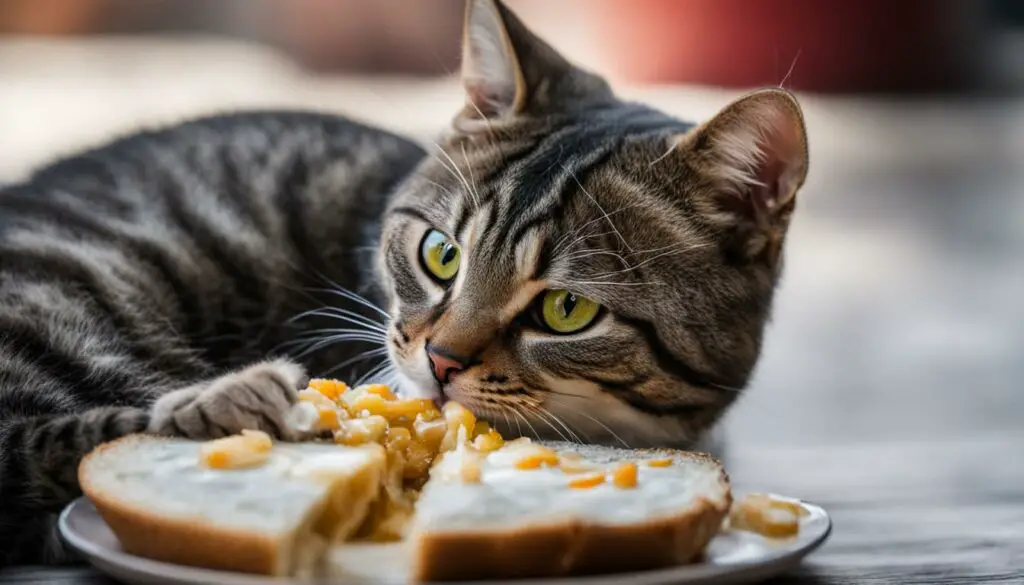
Stress as a Possible Cause of Teeth Grinding in Cats
Stress can occasionally be a contributing factor to teeth grinding in cats. While it is relatively rare, it is important to note that stress should not be assumed as the sole cause of teeth grinding without considering other potential sources of pain. Cats can experience stress due to various factors, such as changes in their environment, social conflicts, or medical conditions. Therefore, it is crucial to evaluate stress-related teeth grinding alongside other symptoms and potential causes.
If you suspect that stress may be a contributing factor to your cat’s teeth grinding, it is essential to create a calm and relaxing environment for them. Provide a safe space where they can retreat and feel secure, away from any potential stress triggers. Additionally, engaging in interactive play sessions and offering environmental enrichment, such as puzzle toys or scratching posts, can help alleviate stress in cats.
It is important to remember that teeth grinding in cats is often a sign of pain and discomfort. If you notice your cat grinding their teeth, it is recommended to consult a veterinarian to determine the underlying cause and appropriate treatment options. A veterinarian will be able to conduct a thorough examination and provide tailored advice based on your cat’s specific needs.
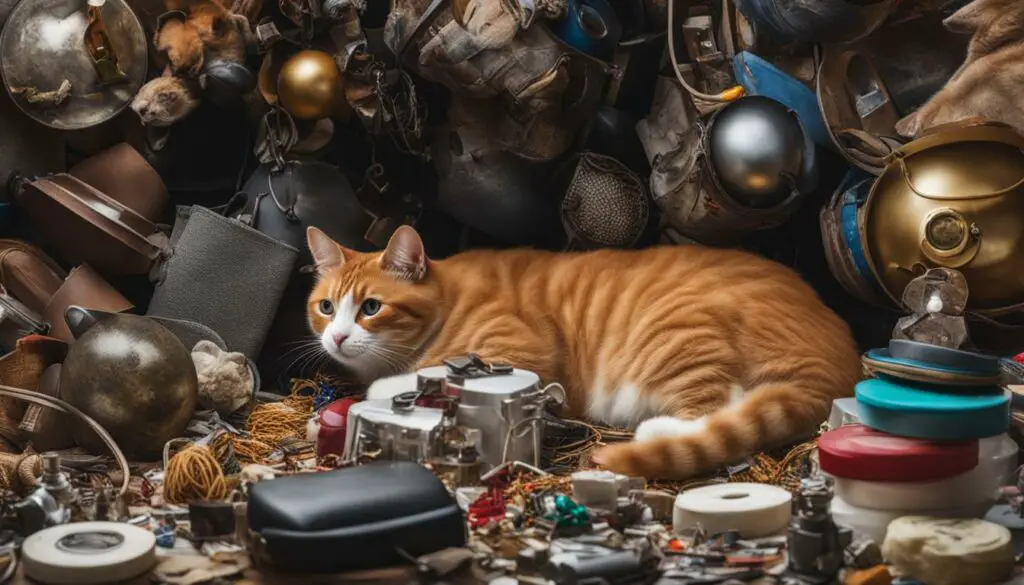
When to Consult a Veterinarian
If your cat is making a crunching noise with their mouth and showing signs of teeth grinding, it’s important to consult a veterinarian. Teeth grinding in cats is a sign of pain, and identifying the underlying cause is crucial for their well-being. A veterinary professional will perform a thorough dental examination, physical examination, and may recommend additional tests such as blood tests or scans to determine the source of the problem.
During the dental examination, the veterinarian will closely inspect your cat’s teeth, gums, and oral cavity for any abnormalities or signs of dental disease. They may also check for other potential causes of teeth grinding, such as oral tumors or tongue injuries. This comprehensive evaluation will help in formulating an accurate diagnosis and appropriate treatment plan.
In some cases, anesthetic procedures may be necessary to fully assess your cat’s oral health. This allows the veterinarian to thoroughly examine the mouth and perform any necessary dental procedures, such as tooth extractions or restorative crowns. Anesthetic procedures ensure the cat’s comfort and safety during the examination and treatment process.
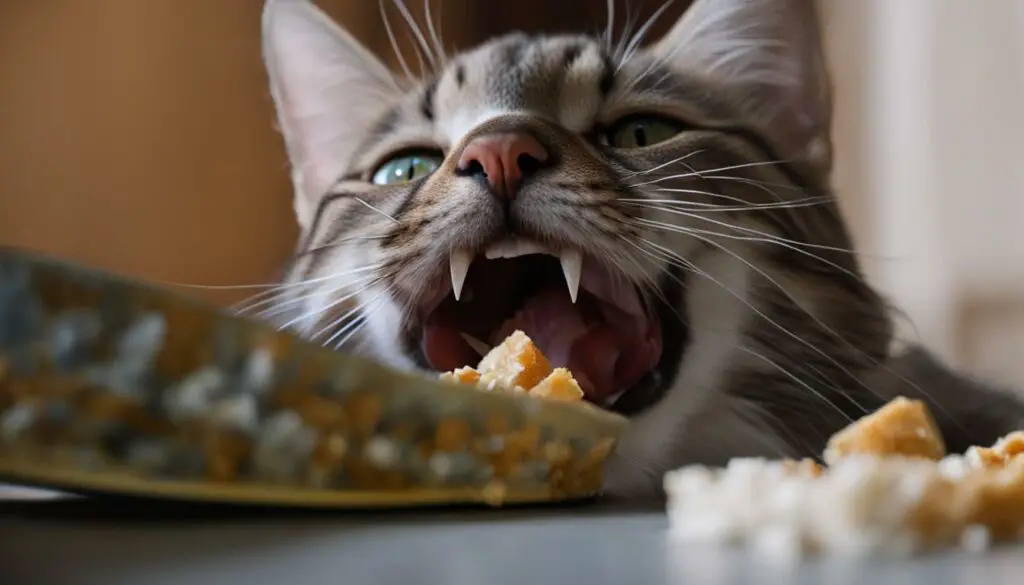
Remember, early intervention is key when it comes to addressing teeth grinding in cats. By seeking veterinary care, you can provide your cat with the pain relief and dental treatment they need to alleviate discomfort and improve their overall oral health.
Prevention and Treatment of Teeth Grinding
Proper dental hygiene is vital in preventing teeth grinding in cats. Regular brushing of your cat’s teeth, using a feline toothbrush and toothpaste recommended by your veterinarian, can help maintain oral health. Brushing your cat’s teeth daily is ideal, but even a few times a week can make a difference. Be patient and gentle when introducing tooth brushing to your cat, and reward them with praise or treats to create a positive association.
In addition to regular brushing, using an oral hygiene gel recommended by your veterinarian can provide additional protection against dental diseases. These gels help prevent the formation of plaque and tartar, reducing the risk of tooth decay and gum disease. Apply the gel to your cat’s teeth and gums as directed, ensuring proper coverage.
Scheduling regular dental cleanings for your cat is essential. This procedure, performed by a veterinarian under anesthesia, allows for a thorough examination and cleaning of your cat’s teeth and mouth. It also provides an opportunity to address any dental issues that may be contributing to teeth grinding. During the cleaning, your cat’s teeth will be scaled to remove plaque and tartar build-up, and any necessary extractions or restorative treatments can be performed.
| Tips for Preventing Teeth Grinding |
|---|
| Regularly brush your cat’s teeth using a feline toothbrush and toothpaste recommended by your veterinarian. |
| Use an oral hygiene gel recommended by your veterinarian to reduce plaque and tartar formation. |
| Schedule regular dental cleanings for your cat to ensure a thorough examination and cleaning. |
| Provide appropriate dental treats or toys that promote healthy teeth and gums. |
| Monitor your cat’s diet and avoid foods that may contribute to dental issues. |
Remember, prevention is key when it comes to teeth grinding in cats. By implementing a proper dental hygiene routine, scheduling regular dental cleanings, and providing appropriate dental care, you can help keep your cat’s teeth healthy and prevent teeth grinding.
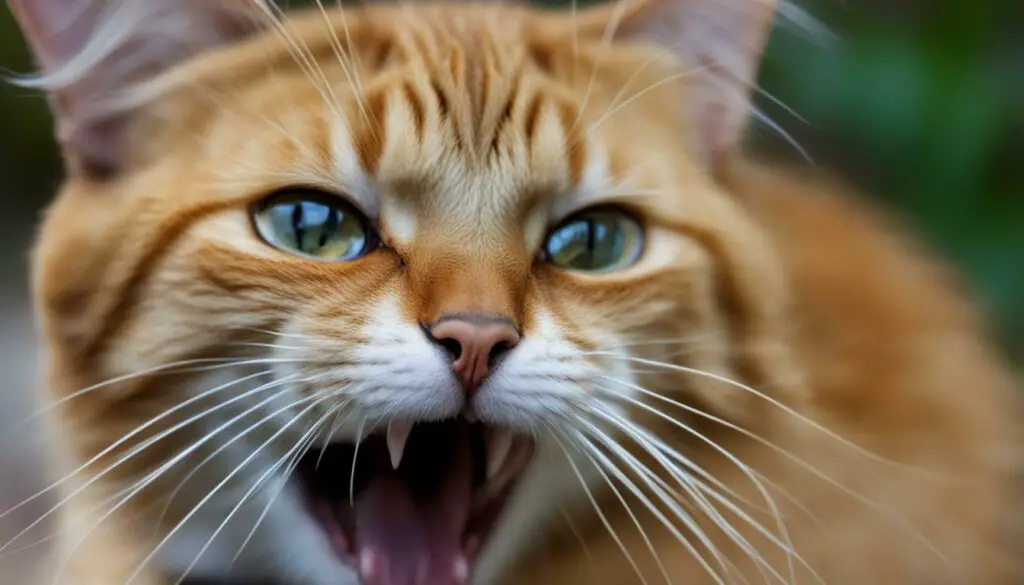
Signs of Mouth Pain in Cats
If you notice your cat making crunching noises with their mouth, it could be a sign of mouth pain. Cats are known to hide their discomfort, so it’s important to pay attention to other signs that may indicate mouth pain. Here are some common signs to look out for:
- Dribbling or drooling
- A reluctance to eat or being picky with food
- Dropping bits of food while eating
- Bad breath
- Weight loss
- Excessive grooming
- Changes in behavior such as being quieter than usual or sleeping more
If you notice any of these signs, it’s crucial to consult a veterinarian for further evaluation. Mouth pain in cats can be caused by dental issues, mouth ulcers, injuries, tumors, or other underlying health problems. A veterinarian will be able to diagnose the cause of the mouth pain and recommend appropriate treatment options.
In some cases, dental x-rays, CT scans, and lab work may be needed to determine the cause of the mouth pain. Treatment may include dental cleaning, tooth extraction, pain relief medications, or other interventions depending on the underlying issue. Early detection and treatment of mouth pain are essential to ensure your cat’s comfort and overall well-being.
Remember, as a cat owner, you play a crucial role in monitoring your cat’s health. Regular check-ups with a veterinarian and maintaining good dental hygiene can help prevent and detect mouth pain in cats. By staying vigilant and seeking veterinary care when necessary, you can help keep your furry friend happy and healthy.
Table: Signs of Mouth Pain in Cats
| Signs of Mouth Pain |
|---|
| Dribbling or drooling |
| A reluctance to eat or being picky with food |
| Dropping bits of food while eating |
| Bad breath |
| Weight loss |
| Excessive grooming |
| Changes in behavior such as being quieter than usual or sleeping more |
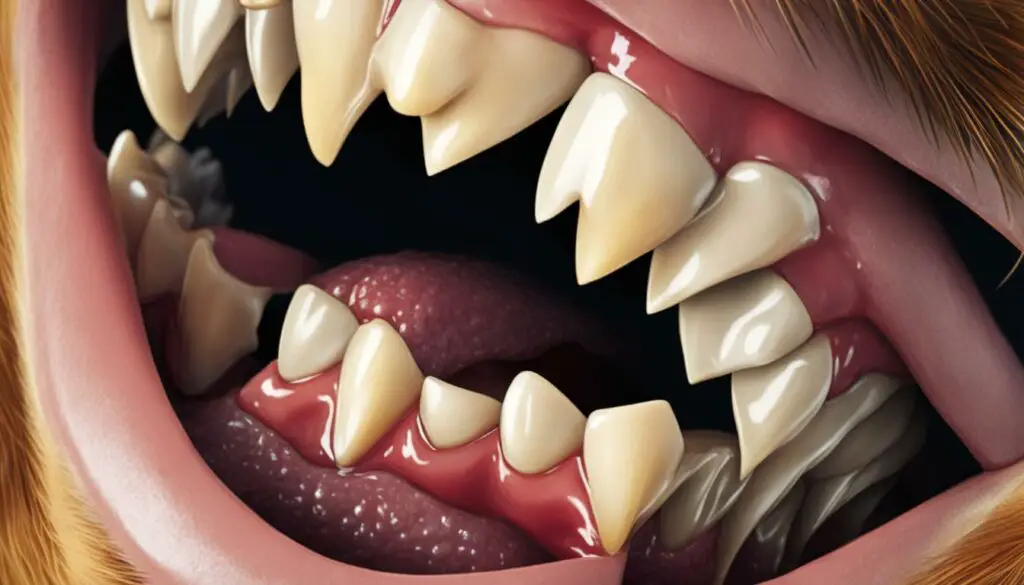
The Importance of Veterinary Care
When it comes to a cat making a crunching noise with its mouth, seeking veterinary care is of utmost importance. Teeth grinding in cats is often a sign of pain or discomfort, and it’s crucial to address the underlying cause. A veterinarian will be able to evaluate the teeth grinding, provide a thorough dental examination, and recommend appropriate treatment options.
Through veterinary care, the cause of the teeth grinding can be identified. This may involve dental x-rays, CT scans, lab work, and even tissue biopsies in some cases. Once the cause is determined, the veterinarian can develop a treatment plan that may include pain relief medications and dental procedures, such as dental cleaning or tooth extraction.
Veterinary care also plays a significant role in preventing future teeth grinding in cats. Regular check-ups and dental exams can help identify any dental issues early on, allowing for prompt treatment and prevention of further complications. Additionally, a veterinarian can provide guidance on proper dental hygiene practices, such as teeth brushing and a suitable feline diet that promotes oral health.
Quotes:
“Veterinary care is essential for evaluating the cause of teeth grinding in cats and providing appropriate treatment options.” – Dr. Samantha Johnson, DVM
“Regular check-ups with a veterinarian and proper dental hygiene practices can help prevent teeth grinding in cats.” – Dr. Emily Roberts, DVM
Table: Common Causes of Teeth Grinding in Cats
| Cause | Description |
|---|---|
| Dental Diseases | Includes tooth resorption, inflammatory gum disease, ulcers, cancer, and abnormal alignment of the teeth. |
| Abdominal Diseases | Conditions affecting the organs in the tummy, such as the stomach, intestines, pancreas, or liver, can also lead to teeth grinding. |
| Stress | While rare, stress can be a possible cause of teeth grinding in cats. |
| Other Health Issues | Mouth ulcers, mouth injury, tumors, tongue injury, and fractured teeth can also result in teeth grinding. |
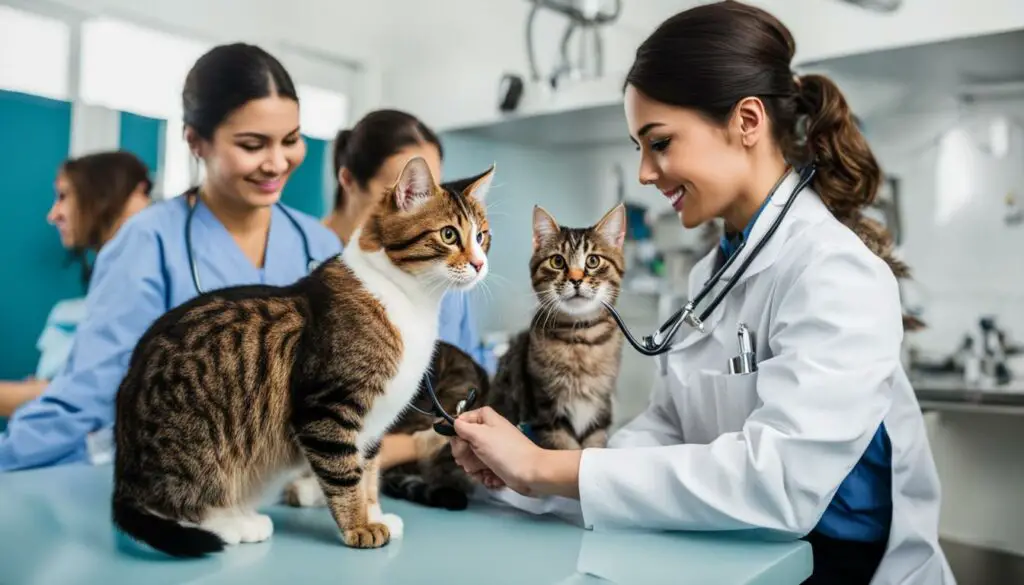
Preventing Teeth Grinding in Cats
When it comes to preventing teeth grinding in cats, maintaining proper dental hygiene is key. Regular teeth brushing and professional cleanings can help keep your cat’s teeth and gums healthy. Brushing your cat’s teeth daily, starting at the age of two, can significantly reduce the risk of dental issues and teeth grinding. Use a feline toothbrush and toothpaste specifically designed for cats to ensure their safety and effectiveness.
In addition to dental hygiene, regular check-ups with a veterinarian are essential. During these check-ups, the vet can perform dental exams to detect any early signs of dental disease or abnormalities. Cats over the age of five should have dental exams at least once a year. Early detection and intervention can prevent dental diseases from progressing and causing teeth grinding.
An appropriate diet also plays a significant role in preventing teeth grinding in cats. Feeding your cat a balanced and nutritious diet that promotes dental health can help maintain strong teeth and gums. Discuss with your veterinarian to determine the best diet for your cat’s specific needs.
| Preventive Measures for Teeth Grinding in Cats |
|---|
| Regular teeth brushing |
| Professional dental cleanings |
| Regular check-ups with a veterinarian |
| Appropriate diet for dental health |
By implementing these preventive measures, you can help ensure that your cat maintains optimal oral health and reduce the risk of teeth grinding. Remember, prevention is always better than cure when it comes to your beloved feline friend’s dental well-being.
Conclusion
Teeth grinding in cats, also known as cat making crunching noise with mouth, is a clear indication of pain and discomfort. To ensure the well-being of your furry friend, it is crucial to seek veterinary care and address the underlying cause of this behavior. By working closely with a veterinarian, you can identify the source of teeth grinding and develop an appropriate treatment plan.
Veterinary care plays a pivotal role in the prevention and treatment of teeth grinding in cats. Regular check-ups, dental examinations, and prompt intervention can help detect dental issues early on, ensuring your cat’s oral health remains in top condition. Additionally, implementing good dental hygiene practices, such as regular teeth brushing and providing an appropriate diet, can significantly contribute to preventing teeth grinding in the long run.
Remember, the well-being of your cat is of utmost importance. If you notice any signs of mouth pain or teeth grinding, including bad breath, weight loss, or changes in behavior, it is essential to consult a veterinarian for a comprehensive evaluation. By prioritizing veterinary care, practicing prevention strategies, and maintaining a healthy dental routine, you can ensure your cat’s comfort and happiness for years to come.
FAQ
Why is my cat making a crunching noise with their mouth?
The crunching noise could be due to teeth grinding, which can have various causes, including dental diseases, tooth resorption, inflammatory gum disease, ulcers, cancer, and abnormal tooth alignment. It’s important to consult a veterinarian to determine the underlying cause.
What are the causes of cat teeth grinding?
Cat teeth grinding can be caused by dental diseases, such as tooth resorption, inflammatory gum disease, ulcers, cancer, and abnormal tooth alignment. Some breeds are more prone to teeth grinding due to their facial structure or tooth alignment. Teeth grinding can also be a symptom of health problems outside the oral cavity, such as abdominal diseases, brain disorders, and behavioral issues.
How can the causes of teeth grinding in cats be identified?
Identifying the causes of teeth grinding in cats usually requires a regular examination, dental x-rays or CT scans, lab work, and sometimes tissue biopsies. These procedures can help identify dental diseases, tumors, inflammation, and other underlying issues that may be causing the teeth grinding.
What are the treatment options for cat teeth grinding?
Treatment for cat teeth grinding focuses on relieving pain and addressing the underlying medical issues. Options may include dental cleaning, tooth extraction, restorative crown, pain relief medications, and a treatment program designed by a veterinarian.
What lifestyle changes can help prevent teeth grinding in cats?
Daily teeth brushing, regular dental exams, and feeding a feline diet that promotes healthy teeth and gums can help prevent teeth grinding in cats.
How do dental issues contribute to teeth grinding in cats?
Dental issues such as tooth decay, gum disease, tartar buildup, cavities, gum recession, abscesses, and Feline Odontoclastic Resorptive Lesions (FORLs) can cause pain and discomfort, leading to teeth grinding in cats.
What are other causes of mouth pain in cats?
Mouth ulcers, mouth injury, tumors, tongue injury, fractured teeth, and pain from organs in the tummy can also cause mouth pain and potentially lead to teeth grinding in cats.
Can stress be a cause of teeth grinding in cats?
While rare, stress can be a potential cause of teeth grinding in cats. However, it’s important to consider other potential sources of pain before assuming stress as the cause.
When should I consult a veterinarian about my cat’s teeth grinding?
It’s important to consult a veterinarian if your cat is grinding their teeth, as it is a sign of pain. A veterinarian can perform a physical examination and may recommend further tests, such as blood tests, scans, or anesthetic procedures, to identify and treat the source of the pain.
How can teeth grinding in cats be prevented and treated?
Prevention and treatment of teeth grinding in cats involve maintaining good dental hygiene through regular brushing, using oral hygiene gel recommended by a veterinarian, scheduling dental cleanings if necessary, and implementing appropriate treatment options recommended by a veterinarian.
What are the signs of mouth pain in cats?
Signs of mouth pain in cats include teeth grinding, dribbling or drooling, reluctance to eat or being picky with food, dropping bits of food while eating, bad breath, weight loss, excessive grooming, and changes in behavior such as being quieter than usual or sleeping more.
How important is veterinary care for teeth grinding in cats?
Veterinary care is essential for evaluating teeth grinding in cats and providing appropriate treatment. A veterinarian can identify the underlying cause, recommend treatment options, and help maintain a cat’s oral health through regular check-ups and dental exams.
How can teeth grinding in cats be prevented?
Teeth grinding in cats can be prevented through proper dental hygiene, including regular teeth brushing, using oral hygiene gel recommended by a veterinarian, scheduling dental cleanings if necessary, and feeding a cat an appropriate diet that promotes dental health.

